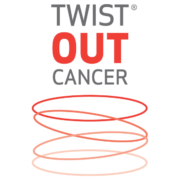How Art’s Healing Abilities Can Help Those Touched by Cancer
– Jenna Benn Shersher, Twist Out Cancer Founder and CEO
When I was diagnosed with a rare blood cancer at 29 years old, I turned to the creative arts. Anyone with a cancer journey knows the experience is isolating, due to being immunocompromised. I craved human connection but knew I had to forgo it for treatment.
Feeling particularly lonely one day, I decided to put myself out there. A lifelong dancer, I queued Chubby Checker’s “The Twist,” hit ‘record’ and did the only move my body could muster: The Twist.
I uploaded the video to YouTube, not thinking much of its potential. Within a day, I went from feeling so alone to having the thousands respond to my video positively, even creating their own versions of The Twist.
Through my cancer experience, I learned that when you share, the world opens up. I thought, ‘If something as simple as The Twist could engage so many people, what else is possible?’ I explored that idea during my cancer treatment and came up with a concept I needed to act on.
I knew the way I felt when strangers embraced me. What if I could recreate that on a micro level?
Twist Out Cancer is Born
 Art is a powerful way to communicate feelings nonverbally. I didn’t need to speak in my video but intrinsically, viewers understood my struggle. I didn’t have to repeat my trauma, all I had to do was twist.
Art is a powerful way to communicate feelings nonverbally. I didn’t need to speak in my video but intrinsically, viewers understood my struggle. I didn’t have to repeat my trauma, all I had to do was twist.
Studies show cancer many patients and survivors experience post-traumatic stress disorder. Combined with how trauma affects the brain’s speech centers, nonverbal therapy can be transformational for individuals who have developed PTSD associated with cancer.
I loved how strangers showed up to support me during my cancer treatment. It was an experience that truly showcased human connection’s power. Through my newfound inspiration, a concept arose.
Could I engage artists to tell a story about a stranger touched by cancer?
Twist Out Cancer was born.
Share. Connect. Heal.
Twist Out Cancer exists to harness art’s healing properties.
Our signature program, Brushes with Cancer, pairs an artist with an individual touched by cancer, called an ‘Inspiration.’ Strangers when they meet, the pair connects over four months. During this time, the artist is tasked with creating artwork representative of their Inspiration’s story.
The program culminates with an art exhibition that showcases works from the pairs. The art is auctioned at the evening’s end, with proceeds going toward Twist Out Cancer’s programming. In 2024, we are proud to expand Brushes with Cancer to multiple programs, with a portion licensed to hospital systems.
Over 12 years, Twist Out Cancer has impacted 257,000 people through programming. In addition to Brushes with Cancer, the organization hosts regular virtual and in-person Twistshops, art therapy workshops led by an art therapist.
Prior to 2020, our Twistshops were held in person. When the pandemic forced us to live virtual lives, we discovered how necessary it was to make these experiences accessible.
Connections Across the Globe
Twist Out Cancer has always been an international organization. We’ve held events in multiple countries and boast participants from all over the globe. It only made sense to lean into virtual spaces.
And when we did, the community responded. Our virtual Twistshops were a hit and we’ve incorporated them into our programming ever since. Similarly, we’ve made our Brushes with Cancer events more accessible, offering a virtual option for those unable to travel.
For our 2023 Midwest Brushes with Cancer program, we had five international participants—two from Germany, two from the Netherlands and one from Croatia. Dr. Antje Petershagen, who lives in Germany, was paired with Alejandro Lopez-Rincon, who is based in the Netherlands. The pair taught us distance doesn’t diminish connection.
“He is so perfect,” Dr. Antje said in an interview. “I could not have found a better match in my life. This is number one.”
For Lopez-Rincon, participating as a Brushes with Cancer Artist was a learning experience that pushed his craft.
“I started as an artist, and I would say I became a student after talking with my Inspiration,” he told us in a testimonial.”Life does not stop after a cancer diagnosis. Art therapy is known to help with depression, to give meaning. This is why Twist Out Cancer is so important.”



